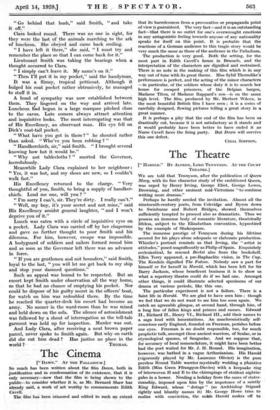The Theatre
[64 HAROLD." By ALFRED, LORD TENNYSON. AT THE COURT
THEATRE.]
WE are told that Tennyson, after the publication of Queen. Mary, with its fine character study of the embittered Queen, was urged by Henry Irving, George Eliot, George Lewes, Browning, and other eminent mid-Victorians "to continue writing more dramas."
Perhaps he hardly needed the invitation. Almost all the nineteenth-century poets, from Coleridge and Byron down to Swinburne and Robert Bridges, showed themselves sufficiently tempted to proceed also as dramatists. Thus we possess an immense body of romantic literature, theatrically lifeless, subject to the Elizabethan convention, hypnotized by the example of Shakespeare.
The. immense prestige of Tennyson during his lifetime secured for his plays alone adequate or elaborate production. Whistler's portrait reminds us that Irving, the "artist in attitudes," posed magnificently as Philip of Spain. Exquisitely ecclesiastical, he rescued Becket also from the bookshelf. Ellen Terry appeared, a pre-Raphaelite vision, in The Cup. The Kendals dignified The Falcon. Nobody saw a part for himself or for herself in Harold, which has been left for Sir Barry Jackson, whose beneficent business it is to show us what a repertory theatre could do if we had one. Amongst other things, it could illustrate selected specimens of our drama at various periods, like this one.
The particular experiment is not a failure. There is a faint life in Harold. We are glad to have seen him ; though we feel that we do not want to see him too soon again. We catch an agreeable glimpse, at second hand, through him, of a long line of fallen kings and princes and causes. Edward II., Richard II., Henry VI., Richard III., add their names to a saga loud with lamentations. An anachronistically self- conscious early England, founded on Freeman, perishes before our. eyes. Freeman is no doubt responsible, too, for much prophetic talk, amongst these ancient warriors, of Senlac, or in etymological spasms, of Sanguelac. And we suppose that, for accuracy of local nomenclature, it might have been better had the poet waited for Mr. J. H. Round. His imagination, however, was bathed in a vague Arthurianism. His Harold (vigorously played by Mr. Laurence Olivier) is the pure peerless Reund Table warrior mystically wedding a plaintive Edith (Miss Gwen Ffmngeon-Davies) with a keepsake ring of interwoven H and E to the chirrupin,gs of strident nightin- gales in a bower. Needing a holiday from the cares of states- manship, imposed upon him by the impotence of a saintly King Edward, whose " dotage " (as Archbishop Stigand rightly and bluntly names it) Mr. George Howe tries to realize with conviction, the noble Harold makes off to hawk and hunt on the Continent. He is shipwrecked in Normandy, where, of course, the ruthless William entraps him into swearing away his inheritance upon those celebrated relics. The incident, very dramatically displayed, is the pivot of the play. At this time of day it is difficult for us to take it seriously ; and Tennyson does not convince us that he takes it seriously either ; as the real Harold probably had to, since it may have set the whole Papal machine working against him. From the very start we know that Harold is doomed—know it to the destruction of dramatic suspense right up to the scene in which Stigand recounts the ebb and flow of the last battle to the fainting Edith. But there is a grandeur of pathos in Harold's fight against Fate personified by William, in Mr. Scott Sunderland's fine performance. The last tableau—William picking his way amidst the prone bodies—is hard to stage. It proved to be beyond the resources of the Court Theatre, and on the whole I cannot praise Mr. Ayliff's production, or the crude colouring of the scenic designs which recall the best Tottenham Court Road fur- nishers, rather than the Bayeux tapestry. Perhaps—might it have been wiser ?—Sir Barry Jackson's penchant for modern dress might have been indulged in this instance ; with the Prince Consort as Harold and with a William heavily side- whiskered. But we are grateful for the effort made, as for all Sir Barry Jackson's work during this season ; though personally I should infinitely have preferred his once promised revival of The Master Builder. RICHARD JENNINGS.





































 Previous page
Previous page